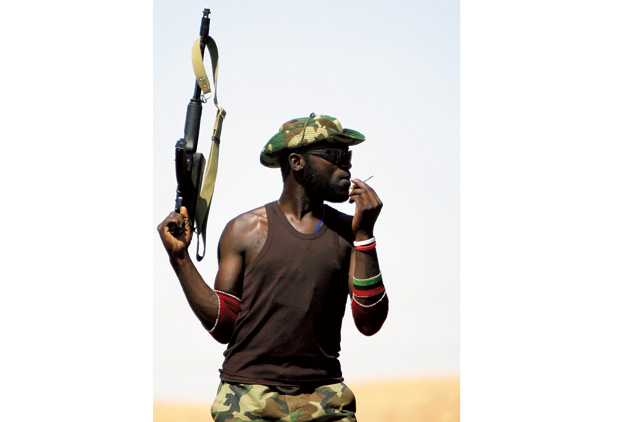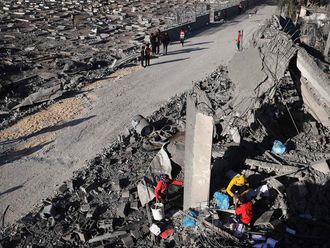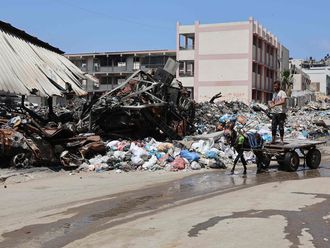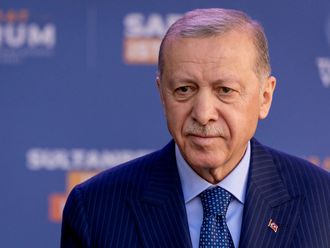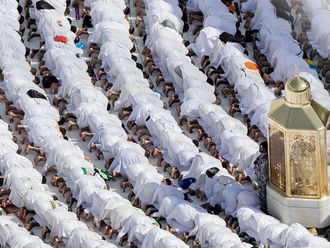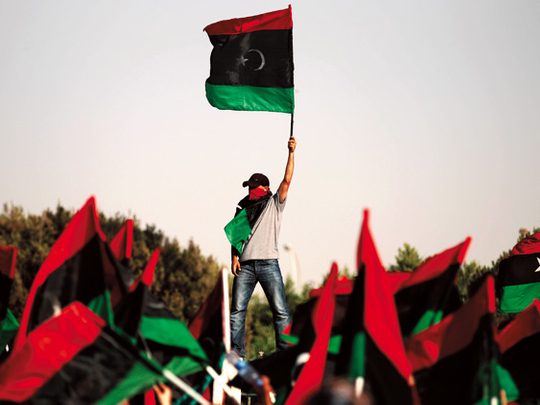
Decked out in Colonel Gaddafi’s hat and gold chain, speaking to television crews from within the walls of the dictator’s Bab Al Azizia compound in Tripoli on August 23, a freedom fighter who identified himself only as Al Windy unwittingly became
the image of Libya’s liberation.
But another, more everyday, image unseen by the press came over my laptop from my cousin, the son of my dad’s sister, who lives 1.5km east of the fallen dictator’s residence. (My cousin won’t be named in this feature to protect his identity).
My aunt left England in the late 1970s when she married my uncle, a Libyan national, who had studied in our hometown. For a family split by distance such as this, it usually means reunions or at least phone calls are limited to weddings or funerals, but most recently civil war had surpassed both to bring us closer together.
When Hosni Mubarak was ousted through a revolution in Egypt on February 11, a month after Zine Al Abidine Ben Ali was overthrown in Tunisia, freedom sometimes means a good photo opportunity our social network conversations had become far more frequent. My cousin and I had already been discussing the prospect of his forthcoming and compulsory six-month military service, without which he couldn’t start his career after college. But as anarchy erupted in Benghazi and Eastern Libya he sounded anxious to avoid the call-up at all costs.
But the thought of fleeing the place he called home, leaving his family and friends, so he could take advantage of hisBritish passport appealed almost as much as conscription in Gaddafi’s army. On February 4 I had messaged him: “Is everything OK in Libya? I heard something on the news. Tunisia, Egypt and now Libya?” He replied: “Yes, I hope so.” But this would be our last online conversation until August as online activity was either closed or, according to rumour, heavily monitored. Phone calls were equally as cagey as paranoia surrounded any talk of politics.
At times using the status update bar on messenger was the only way to have a stuttered and limited communication, as chat and mail were blocked and inoperable. I had never gauged his feelings toward the leader who Ronald Reagan had so famously dubbed ‘the mad dog of the Middle East’ until the fallen dictator’s residence Bab Al Azizia was overrun in the fall of Tripoli, just days after my cousin had finally got back online after six months of black-out. August 22: “Woke up at 11 with the sound of an explosionin the sky. There are people atop our flat firing their Kalashnikovs. Some bullets flew past our house. We are OK, thank God. Nato dropped four bombs on Bab Al Azizia about 1.5km east from here. We are now at the frontline in the battle for Tripoli …That was loud! Several explosions just went off nearby!”
August 22: “Our neighbourhood is being patrolled by boys from the area with guns to protect against any outlaws. If they do come, there could be some heavy fighting. Now I know what it’s like to be in a war! Around the time images of Al Windy in Gaddafi’s cap were splashed across the media, my cousin posted again.
August 23: “Libya is free of the tyrant and his sons. Die in hell, you rat! I hope they find you and kill you slowly by cutting your body into parts with a saw. You deserve it, you killed so many people, burn in hell!”
As months of frustration and a lifetime of suppression were released, a side to my cousin and Libya I had never known had emerged: “No one dared say what I’ve just said before today. If you did, you would end up dead. Freedom, liberation! I am very happy as ‘G’ is over but I still can’t go out and celebrate yet. Still very unpredictable.” The posts were quickly deleted as the failure to capture Gaddafi wore on, as my cousin painfully admitted.
August 23: “Only one hospital is functional and it’s overwhelmed.”
Given my uncle’s side is from the traditional Gaddafi stronghold of Bani Walid, my cousin was faced with mixed loyalties.
August 25: “The battle for Libya is a long way from over. Despite the fact that the freedom fighters took control of Bab Al Azizia two explosions were heard last night at the compound. No fighting is going on in our area, but the Gaddafi fighters still control Rixos Hotel which is not far away, fighting is still going on around there.” August 25: “There’s no running water from the tap, some say it might be poisoned,” he said, paranoid of feared reprisals from the ousted leader who was said to have stockpiled chemical weapons. August 28: “Lights went off at 4pm and came back on again at 12.05am. Having a tough time, I’ve washed my hair in the sink and then used the same water to wash my underwear and flush the toilet. Sometimes the devil you know is better than the one you don’t.”
August 31: “Tripoli consumes 1.5 million litres of water a day, but now it hasn’t even got half of that.” There was also talk of Libya running out of paper moneyas the family struggled to buy their daily essentials. But by September, the mood had changed again.
September 5: “There were bodies around Gaddafi’s compound, it smelt awful. They found bodies in one of the hospitals, around 100 some say 200.” The resumption of water supply and other essentials lifted spirits even as his ancestral hometown of Bani Walid resisted a peaceful handover to the rebels.
September 6: “Libya you’re my heart and soul. We don’t need a civil war, we are one big family whatever our background. Enough of the killing. How many people have to die before it’s too late?”
September 6: “Good job he is running away to Niger with our wealth, billions of dollars. Do you know that around five years ago he said that all Libyans should not earn more than 200 dinars a month (£100)? I see where all that the money goes.” After a visit to Bab Al Azizia, he posted again.
September 11: “When ‘G’ was around, a litre of petrol cost 15 Libyan dinars. You could buy it off the black market as a result of shortage but you’d queue a week and pay 80 dinars for 20 litres. Now three dinars get you 20 litres and there’s not even a five-minute queue.”
Back at work after 205 days on September 13, after six months, three weeks and three days – my cousin has had what he calls the longest holiday of his life. He’s now thriving in the role of rebuilding his country as an engineer – a country under a new guidance e and so many like him would much rather serve.


